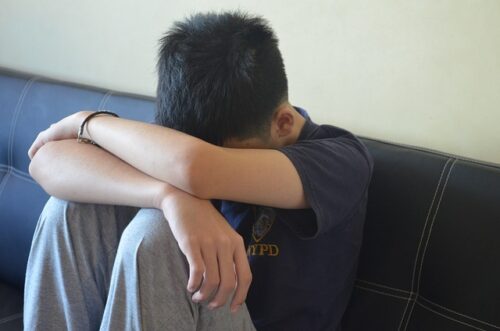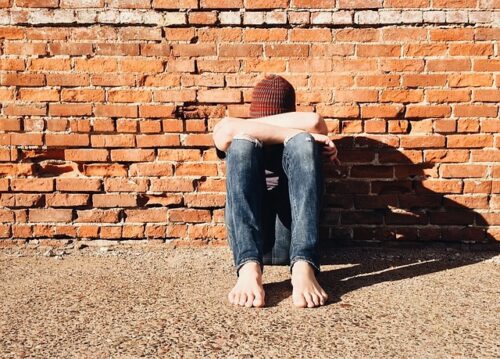
The feeling that something unpleasant will take place or that you are unable to handle a situation is known as anxiety. Along with the emotional response, there are also physical side effects, including “butterflies in the stomach,” tension, tremors, nausea, and sweating. Additionally, it manifests as behaviors like needing a lot of encouragement or avoiding the anxious thing.
Though it can arise in reaction to a particular circumstance or incident, anxiety persists even after it has passed. It can occur even in the absence of a certain circumstance or occurrence. It is normal to have anxiety in life. All people experience anxiety from time to time, and preteen and adolescent years are particularly prone to it.
Anxiety In Teenage Girls
Teenagers with anxiety differ from kids with anxiety. Children used to worry more about stuff like creatures of evil, the dark and horrible things happening to their parents. However, teens are more likely to worry about their needs.
This frequently appears as perfectionism. Teens, especially young women, may be afraid of performing poorly in sports or academic performance. Alternatively, they might be extremely self-conscious about their reputation. They constantly feel bothered about their bodies or physical appearance as well. One major trigger is shifting through the process of puberty sooner or after their friends. While some other kids who struggle with their own anxiety have done so for a while, things are currently getting worse. In other cases, kids who had never had anxiety in the past may develop anxiety in their teens. Anxiety disorders such as panic attacks and social anxiety disorders frequently begin in adolescence.
Teenagers are skilled at masking their emotions, so it can be challenging to identify anxiousness. Signs and symptoms also differ among groups of adolescents. Certain teenagers tend to avoid situations, while some tend to be more agitated or may even attack others around them. They may begin to avoid going to school or may frequently complain of headaches and stomach pain. These same symptoms of anxiety can cause negative emotional responses that hinder child development.
Teens with mood disorders may develop a habit of abusing alcohol or marijuana to calm themselves. In the short run, it functions. However, children’s fear doesn’t truly go away, and using the drug might eventually lead to dependence. Adolescent depression also frequently follows anxiety. A life dominated by worry or avoidance compromises well-being. Adolescents who are apprehensive tend to do less and less, which makes them more depressed.
Common Causes of Anxiety in Teens and Young Adult Girls
Although experiencing anxiety is a common reaction to many life occurrences and circumstances, experiencing anxiety constantly is unhealthy. You may be wondering, as an adult, what teenagers have to worry about. Usually, most of these teenagers don’t have to worry about earning and paying the mortgage, putting food on the table, or raising their own kids. However, there are less complicated things that make me emotionally and mentally unstable.
Here is a list of the typical teenage experiences that may be contributing to their anxiousness.
High Expectations
According to the experts of the Child Mind Institute, teens today often have high expectations for themselves and are often under a lot of stress. Most teenagers desire academic success and may have high expectations for admission to prestigious colleges and universities. Many work part-time jobs and play sports after school. Because of their pressure, they frequently strive to challenge themselves further and occasionally even past their limits to meet social expectations.
Teenage girls nowadays also wish to have active social lives, volunteer, participate in community events, and have household tasks. Teenagers who have to meet these demands not only experience anxiety but also have limited time for quiet time and relaxation. Additionally, many teenagers worry that they might be on a different level than their friends and feel more pressure than ever before to perform well. Therefore, treating anxiety is a must and requires the help of a mental health professional.
Anxiety problems can stem from a variety of factors, including the chores that teenage girls felt were important to their personal development. However, the mental and emotional stability of many young people is very close to collapsing due to emotions of debilitating failure, excessive expectations, and overachievement.

Physical Changes
Adolescent physical changes can be uncomfortable for a lot of teenagers. Children who develop both ahead of or behind the majority of those around them may feel abnormal and out of pace. Teenage girls may become stressed and overthink about this specific scenario. These concerns usually revolve around school, social interactions, or self-image. Often, this causes affective disorders, eating disorders, substance abuse, and even constant negative thought patterns.
Teenage females are more likely to experience mental and emotional problems due to their increased self-consciousness, which can be exacerbated by sudden or delayed changes in their bodies. Problems with late puberty can include weight, peer pressure, persistent bullying, or difficulties in school, all of which have a detrimental effect on one’s self-esteem. However, early development as a person can also result in issues like objectification and sexual harassment.
Even though teenage girls’ bodies often undergo an overwhelming number of noticeable physical changes, these young adults frequently struggle with anxiety or panic. Teens may experience strong feelings they have never felt before or feel bewildered during this stage of natural physiological development. If the changes are not what they anticipated, they could become upset and nervous about how their body is developing.
Hormones
Hormone production in teenage girls fluctuates during adolescence. These teenagers may occasionally experience random feelings of anxiety, agitation, depression, and anger. Hormonal changes are probably partially to blame for some of this. These changes in hormones are typically brought on by menstruation. Hormones are a foundation for tension and anxiety in teenagers, especially when accompanied by a lack of expertise in managing these emotions and overall immaturity.
Teenagers are defined by numerous physical and hormonal changes. Teens’ emotional states will shift as their hormone production matures. Teenage girls occasionally may also seem anxious, frustrated, or even depressed for no apparent reason since they lack the ability to properly manage their state of mind and emotions during hormonal fluctuations. They can’t even concentrate on small tasks of physical activity and often struggle with eating habits and anxiety provoking daily life.
Hormonal changes exacerbate anxiousness, and most teenage females struggle to fall asleep because of this issue. Unfortunately, it will create a vicious loop that prevents the body from processing natural transition and leaves little opportunity for adequate rest.
Parental Disapproval
Adolescent girls go through a difficult phase where they seek their parents’ favor but also want to act in ways that counter society and parental authority. Parents and teenagers find this frustrating as well. It’s understandable that kids might experience tension and anxiety when they encounter parental disapproval. Simultaneously, they persist in doing things their parents would not approve of. Although it is a normal and essential stage of development, everyone going through it is under stress.
The majority of teenage girls believe that in a place where they are free from rules, they would be willing to fight for it. The fact that most parents would want to protect their teen girls means that this can frequently cause tension in the family. But because these young ladies sometimes overreact, they frequently find parenting too difficult to manage. In some cases, they even lose particular interest, and adults tend to misinterpret their actions.
Teenage ladies have occasionally been known to defy their parents’ counsel and pursue their own interests. So, some parents just let go and let their adolescents do whatever they want in order to prevent too much psychological and emotional strain. Regrettably, excessive independence can occasionally lead to teenage pregnancy, self-harming behavior, and even drug and alcohol misuse.
Peer Pressure
Peer pressure is a major source of stress for teenage girls nowadays. Stress levels are increased by peer pressure, whether it be negative or favorable. Negative peer pressure is exemplified by the stressful push to shoplift or commit other crimes. The teenagers may feel under pressure to fit in and stay up if their friends are all doing well academically, going to prestigious colleges, and dating the captains of the cheerleading or football teams.
Peer pressure is harmful and can also impact mental health. It can lower self-esteem and result in subpar academic achievement, a break from friends and family, or a rise in worry and sadness. If left untreated, this may eventually cause teenagers to self-harm or consider suicide.
Peer pressure also takes on a whole new dimension due to social media. It indicates that, outside of the typical school day, a young person is always accessible to their peer group. Teenage social media users may become more aware of stressful situations happening in other people’s lives, feel pressured to keep social networks updated, receive unfavorable comments from others, and undergo a physiological stress reaction. Teens who use social media extensively are more likely to experience anxiety, depression, and self-harm.

Poor Family Dynamics
Even though teenagers seem like they hate regulations, they know and understand the need for dependable parental figures to lead and guide them because they can’t always make the greatest judgments. Even while they may not always agree or outright defy rules, adolescents want their parents and other caregivers to take the lead. However, a teenage girl’s anxiety can skyrocket when there is confusion or chaos in the home dynamics.
Teenage girls’ psychological wellness can be negatively impacted by hostile and tense familial structures that are created by arguments, fighting, poor communication skills, fatigue, health issues, and general exhaustion from busy schedules. Children may also experience confusion about their relationships with:
other family members
marriage conflicts
rivalry between siblings
parent-child conflicts
Teenage girls who grow up in unfavorable family life environments—where there is discord and a shortage of warmth and affection—may become emotionally closed off and find it difficult to communicate their feelings. These young individuals could experience stress, fatigue, confusion, and isolation.
Final Thoughts
While some teenagers enjoy stable, productive homes with supporting, caring family members, many have faced difficult situations during their formative teenage years. Speaking with a family member regarding how they are feeling or what they are thinking about getting help from a mental health expert for potential treatment (such as cognitive behavioral therapy) and medication may be beneficial when it comes to teenage girls’ anxiety.
